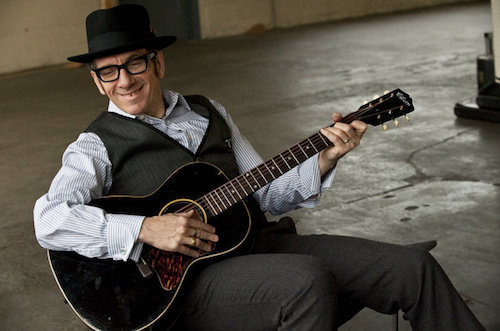
06.06.2016
SONGWRITERS HALL OF FAME INDUCTION: ELVIS COSTELLO DISCUSSES STORIES BEHIND HIS MUSIC
Billboard: Cathy Applefeld Olson: June 3rd 2016:
A conversation with markedly self-aware, often irreverent Songwriters Hall of Fame inductee Elvis Costello can launch into any number of tangents. For this songwriting-focused exchange, he goes deep into the conflict of loyalties that fueled hit “Oliver’s Army,” his time-tested writing process, and why the identity of the subject of “Alison” shall remain a mystery.
This year’s Songwriters Hall of Fame ceremony, June 9 at the Marriott Marquis in NY, also honors Marvin Gaye, Nick Jonas, Tom Petty, Lionel Richie, Nile Rodgers & Bernard Edwards, Chip Taylor and Seymour Stein, who will receive the Howie Richmond Hitmaker award. Performer/presenters at the event, among the industry’s hottest annual tickets, include the B-52’s, James Corden, Kenneth Gamble & Leon Huff, Jennifer Hudson, Marcus Mumford, Roger McGuinn, Rachel Platten, Sister Sledge, Jussie Smollett and Jon Voight.
Who’s that girl?: “It’s a complex relationship people have had over a 30-odd-year period with the song ‘Alison,’ of what I might say the song was to me when I wrote it and that being somewhat different from what their memory of it is. I think it’s a great mistake to be too specific. I’m not about to underline the identity of the person I was musing on because then it becomes something in a box in an interview in Billboard magazine and that follows me around for the rest of my life. I would never need to sing the song again because I would’ve wholly defined it. So if you want me to answer the question, I can announce I’ll never sing the song again but I think you might get some people upset.”
Elvis Costello – Alison from nuno pereira on Vimeo.
“A terrible conflict of loyalties”: “The underpinning of ‘Oliver’s Army’ was my observations of going to Belfast for the first time and seeing young men in British army uniforms, many of whom were really no different than the people they were guarding. I pretty much wrote it on the plane back to London. My grandfather was actually in a British army regiment despite being a full-blooded Irishman. So there are all of these contradictions, which are repeated throughout history. People join the army for a lot of reasons. Frankly, some have no other choice. That was the one that faced some of my friends when I was 17. A lot of people joined the army in England when I was a teenager to get training in a trade — to become a mechanic or an electrician. And the idea that you ever had to actually shoot somebody was much, much further down the list of enticements that got you to sign up. That’s the conundrum the song reflects upon. You find yourself in parts of your own country, which is under semi-martial law, and being asked to aim your rifle at somebody who’s basically the same as you. This is not a question of empathizing with one side or the other, so much as accepting it’s a terrible conflict of loyalties
I could talk all night: “The common sense of it to me is that we have much more to gain in working together than looking for the divisions. That’s my view about pretty much every conflict. The whole job of writing a song like that, particularly in those days in England, was just to get a song like that on the radio that was about something a little less obvious than the songs of the moments. There were lots of people singing song about the usual pop concerns, and this certainly isn’t that.”
Here to stay: “When I wrote that song, I guess it was about 37 years ago… you would have thought by now we would’ve moved beyond conflict, but it only seems to get worse. Like a lot of the songs I wrote a long time ago, I find there are new reasons to sing them. Like this one, and ‘Shipbuilding,’ that are about more somber subject matters, you find they seem to echo off more recent events. Unfortunately the repetition of conflict and the repetition of conflict within an individual — that’s all still there.”
On “Wise Up Ghost”: “The whole album I did with the Roots … the nature of our collaboration was really spontaneous and should probably rightly [be] credited to [co-producer] Steven Mandel as being the conduit for musical ideas between myself and Questlove, and then the members of the Roots contributed their instrumental part. When it came to the lyrics, they left that to me entirely. We never had any consultation about the fact that the lyrics would largely be outward-looking commentary as opposed to introspective, inward-looking commentary about the ways of the heart. Some were retellings of songs I had already set with different music and that was very much, people want to say ‘political,’ but I call it bulletin commentary on what we’re all seeing out the window, and this is my perspective on it.”
Every day I write the book: “I used to carry a notebook all the time. I still do, but now it’s mostly electronic. In those days it was lots of little notebooks that could fit into my pockets and I would write drafts of songs over and over and I suppose that was as close to editorial work as I’d ever really acknowledged. When I was writing my book [2015’s Unfaithful Music & Disappearing Ink] I went back and found my old notebooks and discovered there are differences between these different drafts, it wasn’t just an obsessive thing to write the lyrics out, there are whole verses that got taken out.”